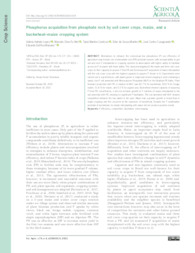Phosphorus acquisition from phosphate rock by soil cover crops, maize, and a buckwheat-maize cropping system.
Phosphorus acquisition from phosphate rock by soil cover crops, maize, and a buckwheat-maize cropping system.
Author(s): LOPES, V. A.; WEI, M. C. F.; CARDOSO, T. M.; MARTINS, E. de S.; CASAGRANDE, J. C.; MARIANO, E. D.
Summary: ABSTRACT: Alternatives to enhance the consensual low phosphorus (P) use efficiency of agriculture may include use of phosphate rock (PR) and plant species with unequal ability to get soil and rock P interplanted in cropping systems to allow plants with higher ability to facilitate access to P of plants with lower ability. This study investigated (i) the maize and three soil cover crops on their capacity to acquire P from PR and (ii) measured P acquisition of maize interplanted with the soil cover crop with the highest capacity to acquire P shown in (i). Experiments were carried out in a greenhouse, with plants grown in single and mixed cropping in pots containing a sandy, low?P soil amended with Monocalcium Phosphate (McP) or the Brazilian PR Itafós. Plant biomass production with PR, in relation to McP, was 83.7 % for buckwheat, 83.6 % for forage radish, 51.8 % for maize, and 0.3 % for pigeon pea. Buckwheat showed capacity of acquiring P from PR; nevertheless, it did not increase growth or P nutrition of maize interplanted in the soil amended with PR, showing no significant P facilitation. The soil amended with McP showed competition between the two plants in the pots. Maize had a greater growth in mixed than in single cropping and this occurred at the expenses of buckwheat. Despite the P mobilization potential of buckwheat, its simple interplanting with maize did not produce positive results.
Publication year: 2022
Types of publication: Journal article
Unit: Embrapa Cerrados
Keywords: Competição, Consórcio, Facilitação, Fósforo
Observation
Some of Embrapa's publications are published as ePub files. To read them, use or download one of the following free software options to your computer or mobile device. Android: Google Play Books; IOS: iBooks; Windows and Linux: Calibre.
Access other publications
Access the Agricultural Research Database (BDPA) to consult Embrapa's full library collection and records.
Visit Embrapa Bookstore to purchase books and other publications sold by Embrapa.

